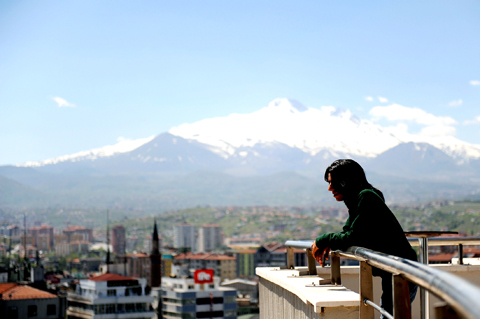Tortured in jails and threatened with death, Behzad, Siyavash and Ali have, like hundreds of dissident Iranians, found refuge in Turkey, but peace of mind is still eluding them as fear of Tehran’s agents remains a daily torment.
While fellow opposition activists are preparing to hold protests in Iran at the anniversary of Iranian President Mahmoud Ahmadinejad’s disputed re-election on June 12 last year, Behzad (not his real name) leads a secluded life in a shabby apartment in Nevsehir, central Turkey.
“The tortures that I went through and those that I witnessed — an animal would not do that to another animal,” the young man said.

PHOTO: AFP
His only fault, he said, was to have participated in a student protest challenging the election results last year.
Showing pictures of his back scarred by bruises after a four-month stint in prison, Behzad lists the horrors to which he was subjected: beating, sexual abuse, forced insomnia, cold water dousing and the terror of standing blindfolded in what turned out to be a mock execution.
“After a while, I would have confessed anything, I could not stand it anymore,” he said. “They wanted confessions about my father, that he had ties with America and Israel ... And they forced me to say so.”
The confessions secured his freedom. Several weeks later, Behzad sneaked into neighboring Turkey, crossing the mountainous border on horseback, in the company of smugglers, like many Iranian exiles.
According to the UN High Commissioner for Refugees (UNHCR), 4,000 Iranian asylum seekers and refugees — political dissidents, but also converts to Christianity, homosexuals and followers of the minority Bahai faith — are registered in Turkey, their main exit route.
The applicants’ numbers since last year’s presidential polls — standing at 1,828 between July and March — does not represent a significant increase, but their profile has changed, according to the UNHCR.
Stuck in Nevsehir, one of the 32 Turkish cities accommodating asylum seekers, Behzad is waiting for the UN to decide his fate and arrange a Western country to accept him.
Handicapped with a stiff leg — the result of a blow from a police truncheon during a demonstration — and suffering psychological problems, he lives in poverty.
However, his main problem is the fear.
“Here, I am afraid of everything: the police, Iranian agents and all Iranians here — I fear they will make reports on me. Sometimes I am even scared to go out,” he said.
For him, the presence of Iranian agents pursuing dissidents is beyond doubt: In late November, he said, an Iranian refugee arrived in Nevsehir and disappeared the following day, leaving behind only unpacked suitcases.
Behzad’s friend, Siyavash, also spoke of a strong sense of insecurity as he showed burns from electric shock on his thighs after several months in an Iranian jail.
“One night, about midnight, three drunk men tried to break the door of my building, shouting. Fortunately, my Turkish neighbors downstairs intervened,” he said.

The latest batch from convicted sex offender Jeffrey Epstein’s e-mails illustrates the extraordinary scope of his contacts with powerful people, ranging from a top Trump adviser to Britain’s ex-prince Andrew. The US House of Representatives is expected to vote this week on trying to force release of evidence gathered on Epstein by law enforcement over the years — including the identities of the men suspected of participating in his alleged sex trafficking ring. However, a slew of e-mails released this week have already opened new windows to the extent of Epstein’s network. These include multiple references to US President Donald

CHARGES: The former president, who maintains his innocence, was sentenced to 27 years and three months in prison for a failed coup bid, as well as an assassination plot Far-right former Brazilian president Jair Bolsonaro is running out of options to avoid prison, after judges on Friday rejected his appeal against a 27-year sentence for a botched coup bid. Bolsonaro lost the 2022 elections and was convicted in September for his efforts to prevent Brazlian President Luiz Inacio Lula da Silva from taking power after the polls. Prosecutors said the scheme — which included plans to assassinate Lula and a top Brazilian Supreme Court judge — failed only due to a lack of support from military top brass. A panel of Supreme Court judges weighing Bolsonaro’s appeal all voted to uphold

Chinese tech giant Alibaba yesterday denied it helps Beijing target the US, saying that a recent news report was “completely false.” The Financial Times yesterday reported that Alibaba “provides tech support for Chinese military ‘operations’ against [US] targets,” a White House memo provided to the newspaper showed. Alibaba hands customer data, including “IP addresses, WiFi information and payment records,” to Chinese authorities and the Chinese People’s Liberation Army, the report cited the memo as saying. The Financial Times said it could not independently verify the claims, adding that the White House believes the actions threaten US security. An Alibaba Group spokesperson said “the assertions

LEFT AND RIGHT: Battling anti-incumbent, anticommunist sentiment, Jeanette Jara had a precarious lead over far-right Jose Antonio Kast as they look to the Dec. 14 run Leftist candidate Jeannette Jara and far-right leader Jose Antonio Kast are to go head-to-head in Chile’s presidential runoff after topping Sunday’s first round of voting in an election dominated by fears of violent crime. With 99 percent of the results counted, Jara, a 51-year-old communist running on behalf of an eight-party coalition, won 26.85 percent, compared with 23.93 percent for Kast, the Servel electoral service said. The election was dominated by deep concern over a surge in murders, kidnappings and extortion widely blamed on foreign crime gangs. Kast, 59, has vowed to build walls, fences and trenches along Chile’s border with Bolivia to